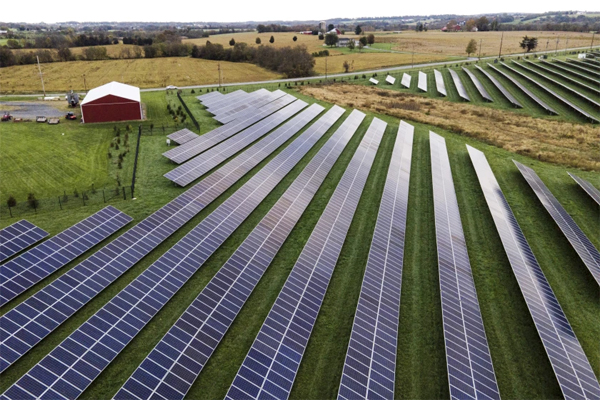
Jennifer A Dlouhy, Bloomberg News
WASHINGTON
EnergiesNet.com 06 07 2022
President Joe Biden took executive action Monday to boost the US solar sector, seeking to revive clean energy projects stalled by a trade dispute and bolster domestic manufacturing so that the nation’s climate efforts are less reliant on foreign suppliers.
Biden is imposing a two-year freeze on new tariffs for solar imports from four Southeast Asia nations, removing a threat of retroactive tariffs that had chilled renewable project construction nationwide. At the same time, he is invoking sweeping powers under the Defense Production Act to support US-made solar panels and other domestic clean-energy manufacturing.
The moves are aimed at boosting oft-competing political priorities: combating climate change and nurturing domestic solar manufacturing that has struggled to compete with cheap imports. It’s possible Biden’s moves could do both in one swoop.
“The president’s action is a much-needed reprieve from this industry-crushing probe,” Abigail Ross Hopper, chief executive officer of the Solar Energy Industries Association, said in a statement. “During the two-year tariff suspension window, the US solar industry can return to rapid deployment while the Defense Production Act helps grow American solar manufacturing.”
Read more: Tariff Fight Paralyzing US Solar Threatens American Steelmakers
Biden’s executive action follows days of brainstorming by administration officials over how to revive solar and power storage projects hampered by a Commerce Department trade investigation that prompted some exporters to halt panel shipments to the US. Although the president is not directly injecting himself in the case — meant to be a quasi-judicial proceeding free from political interference — his decision to waive new duties for two years effectively mutes the tariff threat in the short term, giving time for US manufacturing to ramp up.
Chinese solar panel makers gained on news of Biden’s plans, with Longi Green Energy Technology Co. rising 6.1% in Shanghai while Jinko Solar Co. jumped 8.9% and Trina Solar Co. added 6.3%.
Biden’s action immediately ignited charges he was interfering in the trade case. Mamun Rashid, the chief executive officer of Auxin Solar Inc., the California-based company that successfully pushed Commerce to open the probe, called it “unprecedented and potentially illegal action.”
“He has opened the door wide for Chinese-funded special interests to defeat the fair application of US trade law,” Rashid said in an emailed statement.
The White House is also seeking to use the federal government’s purchasing power to help support American clean energy manufacturers. Biden is directing the federal government to apply domestic content standards when it procures solar systems, including US-manufactured solar photovoltaic components, and use special supply agreements to allow domestic clean electricity providers to more quickly sell their products to the government.
For months, administration officials have argued they couldn’t interfere with the Commerce investigation into whether Chinese companies are circumventing decade-old duties by assembling solar cells and modules in Cambodia, Malaysia, Thailand and Vietnam, countries which constitute about 80% of annual panel imports into the US. Amid the threat of retroactive tariffs, manufacturers in the four targeted nations had largely halted shipments to the US, stalling solar projects and prompting at least one utility to warn it would keep a coal plant operating longer than planned.
At issue are anti dumping and countervailing duties imposed against China a decade ago to offset subsidization and predatory pricing. The Commerce Department is set to issue preliminary findings in the case by late August.
Biden’s move Monday is aimed at providing a two-year bridge for US solar developers to obtain modules and cells duty-free from Southeast Asia, even as the case proceeds, the White House said in a fact sheet.
Auxin in its petition has argued the US must enforce its trade laws to combat “pervasive backdoor dumping” and rebuild the American solar supply chain.
Biden’s manufacturing boost is anchored by action under the 72-year-old Defense Production Act, the same authority wielded by President Harry Truman to make steel for the Korean War and Donald Trump to spur mask production to battle the spread of coronavirus. Biden is authorizing the Department of Energy to use the law to rapidly expand American manufacturing of solar panel parts, building insulation, heat pumps and other gear, according to a White House fact sheet. Power transformers and equipment for making and using fuels generated by electricity also will be targeted, the White House said.
The Defense Production Act move will catalyze finance for clean energy manufacturing including loans and grants, a senior administration official said.
Presidents dating back to George W. Bush have tried to marshal US solar panel making with a mix of short-lived incentives and punishing trade barriers that at times spurred retaliation instead of a manufacturing renaissance. At one point there were some 75 major solar parts factories in the US but most have since shuttered.
Despite the pause on new solar-import tariffs that’s buoying solar stocks Monday, “note that a two-year delay is hardly clarity the industry is seeking as they would like this issue to go away or be resolved,” Jeff Osborne, an analyst at Cowen & Co., said in a note Monday. “This approach allows the Biden team to appear to be responsive to repeated requests for intervention. However, the issue may still be challenged in court, and it is unclear on potential impact of tariffs that may be announced on past shipments.”
The Commerce probe could be closed if Auxin were to withdraw its petition, according to trade lawyers. Executive action under the Defense Production Act could support purchases of panels from Auxin and other domestic manufacturers.
bloomberg.com 06 06 2022












